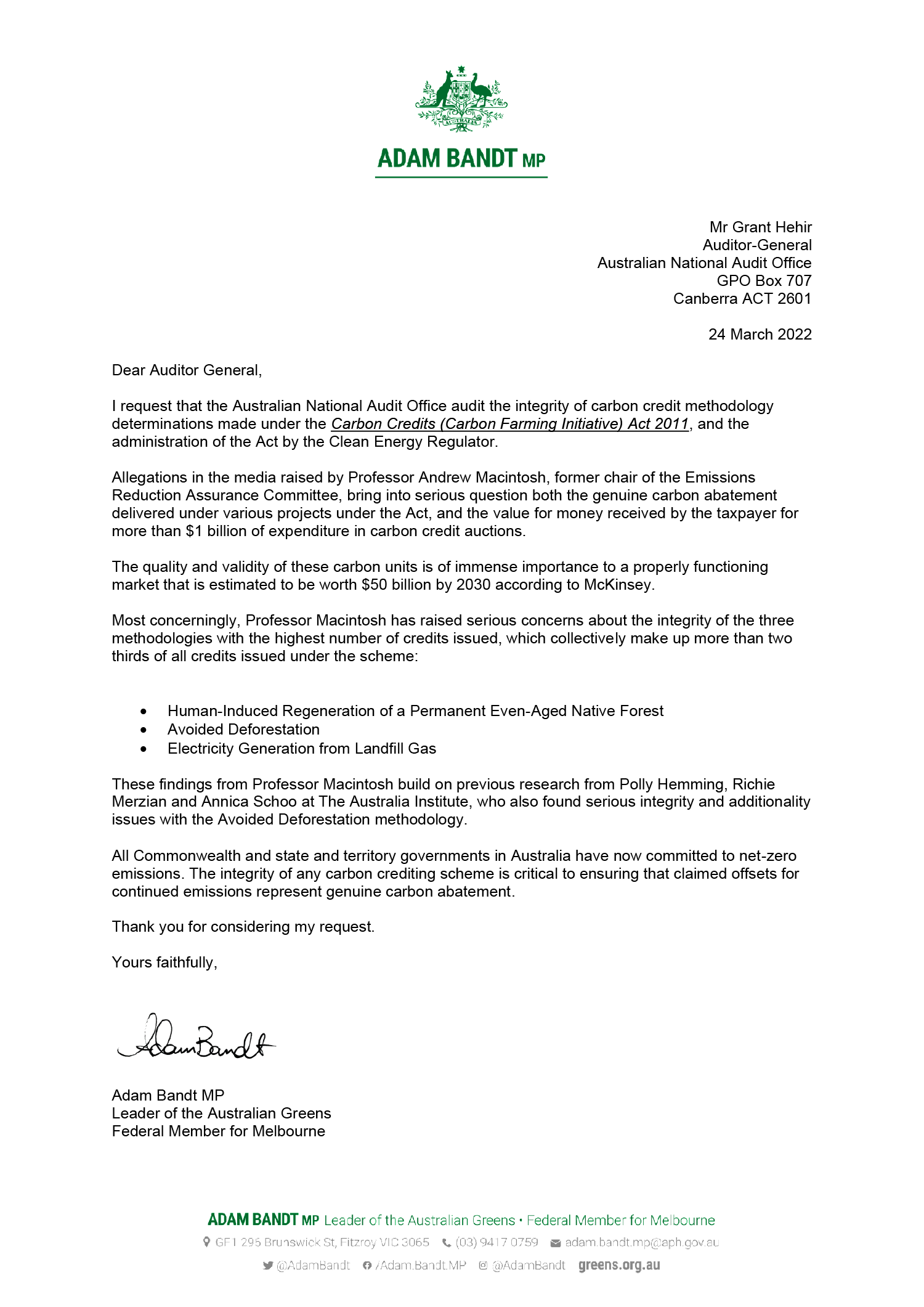Browse our range of reports and publications including performance and financial statement audit reports, assurance review reports, information reports and annual reports.
Integrity of carbon credit methodology determinations made under the Carbon Credits (Carbon Farming Initiative) Act 2011, and the administration of the Act by the Clean Energy Regulator
Please direct enquiries relating to requests for audit through our contact page.
The Auditor-General responded on 13 April 2022 to correspondence from Mr Adam Bandt MP dated 24 March 2022, requesting that the Auditor-General conduct an investigation to examine the integrity of carbon credit methodology determinations made under the Carbon Credits (Carbon Farming Initiative) Act 2011, and the administration of the Act by the Clean Energy Regulator.
Auditor-General's response
13 April 2022
Mr Adam Bandt MP
Leader of the Australian Greens
By email: Adam.Bandt.MP@aph.gov.au
Dear Mr Bandt
Integrity of carbon credit methodology determinations made under the Carbon Credits (Carbon Farming Initiative) Act 2011, and the administration of the Act by the Clean Energy Regulator
I am writing in response to your letter of 24 March 2022 requesting that I consider an audit of the integrity of carbon credit methodology determinations made under the Carbon Credits (Carbon Farming Initiative) Act 2011, and the administration of the Act by the Clean Energy Regulator.
The Australian National Audit Office (ANAO) is currently developing its 2022–2023 Annual Audit Work Program (work program). Consistent with the requirement that I have regard to the audit priorities of the Parliament, a draft of the work program has been provided to the Parliament for consultation through the Joint Committee of Public Accounts and Audit. The draft work program has also been provided to accountable authorities of Australian Government entities affected by proposed audit coverage and published on the ANAO website inviting public comment: https://www.anao.gov.au/work-program/draft.
The draft work program currently includes the topic ‘Contracting and integrity in the Emissions Reduction Fund’ as a potential performance audit in 2022–2023. This audit if commenced would assess the effectiveness of the regulator’s contracting, compliance and assurance activities for the Emissions Reduction Fund. I will therefore consider the matters you have referred as part of the development of this audit topic and the work program consultation process.
The 2022–2023 work program is expected to be published on the ANAO website in early July 2022.
You may also be interested in Auditor-General Report No. 14 2016–17 Abatement Crediting and Purchasing under the Emissions Reduction Fund tabled in September 2016. This audit assessed the effectiveness of the Clean Energy Regulator’s crediting and selection of carbon abatement to purchase under the Emissions Reduction fund. The audit concluded that the Clean Energy Regulator had established sound arrangements to manage the crediting and selection of carbon abatement for purchase under the Emissions Reduction Fund. The report made one recommendation, that the Clean Energy Regulator should ensure that appropriate documentation is retained to demonstrate the rationale for undertaking routine or detailed assessments of abatement crediting applications and that all relevant abatement crediting assessment criteria have been addressed during streamlined assessments.
Yours sincerely
Grant Hehir
Auditor-General
Correspondence from Mr Adam Bandt MP

Transcript of letter from Mr Adam Bandt MP
Mr Grant Hehir
Auditor-General
Australian National Audit Office
GPO Box 707
Canberra ACT 2601
24 March 2022
Dear Auditor General,
I request that the Australian National Audit Office audit the integrity of carbon credit methodology determinations made under the Carbon Credits (Carbon Farming Initiative) Act 2011, and the administration of the Act by the Clean Energy Regulator.
Allegations in the media raised by Professor Andrew Macintosh, former chair of the Emissions Reduction Assurance Committee, bring into serious question both the genuine carbon abatement delivered under various projects under the Act, and the value for money received by the taxpayer for more than $1 billion of expenditure in carbon credit auctions.
The quality and validity of these carbon units is of immense importance to a properly functioning market that is estimated to be worth $50 billion by 2030 according to McKinsey.
Most concerningly, Professor Macintosh has raised serious concerns about the integrity of the three methodologies with the highest number of credits issued, which collectively make up more than two thirds of all credits issued under the scheme:
- Human-Induced Regeneration of a Permanent Even-Aged Native Forest
- Avoided Deforestation
- Electricity Generation from Landfill Gas
These findings from Professor Macintosh build on previous research from Polly Hemming, Richie Merzian and Annica Schoo at The Australia Institute, who also found serious integrity and additionality issues with the Avoided Deforestation methodology.
All Commonwealth and state and territory governments in Australia have now committed to net-zero emissions. The integrity of any carbon crediting scheme is critical to ensuring that claimed offsets for continued emissions represent genuine carbon abatement.
Thank you for considering my request.
Yours faithfully,
Adam Bandt MP
Leader of the Australian Greens
Federal Member for Melbourne